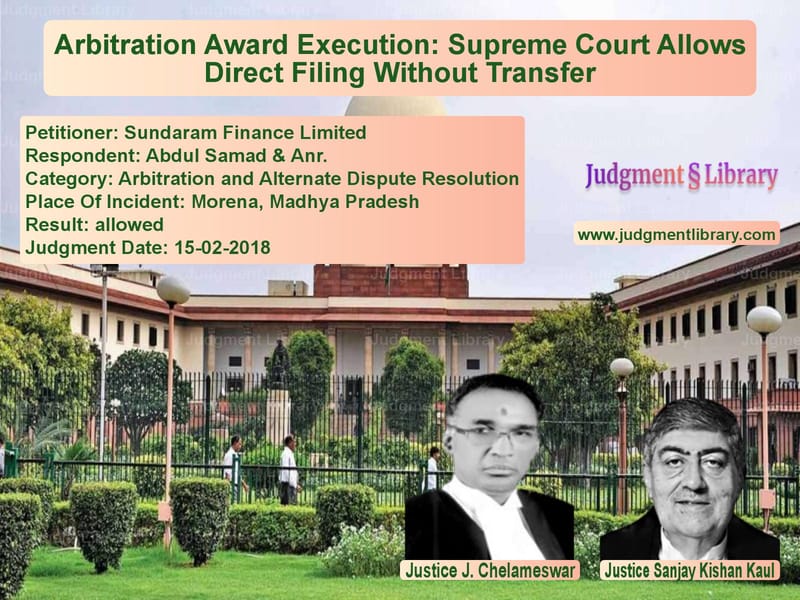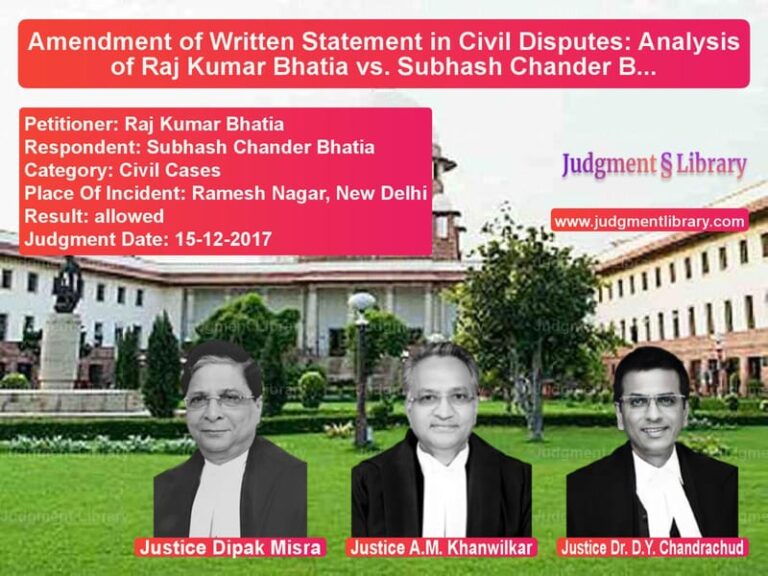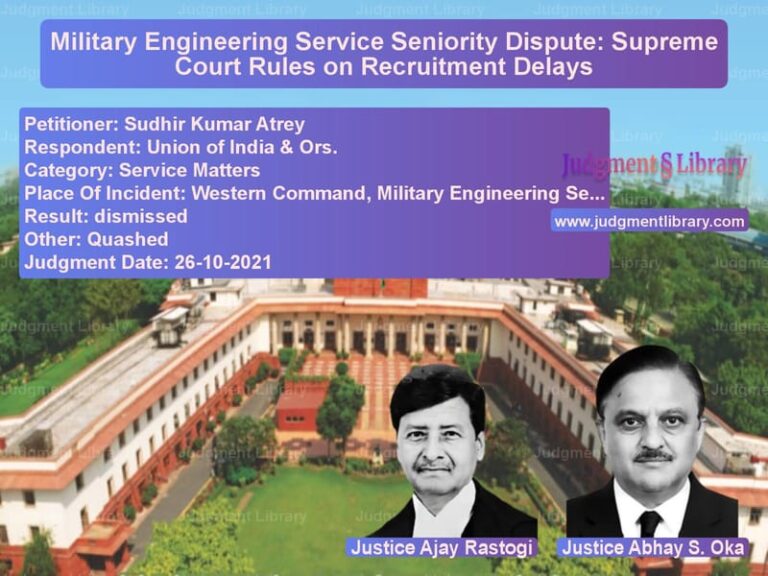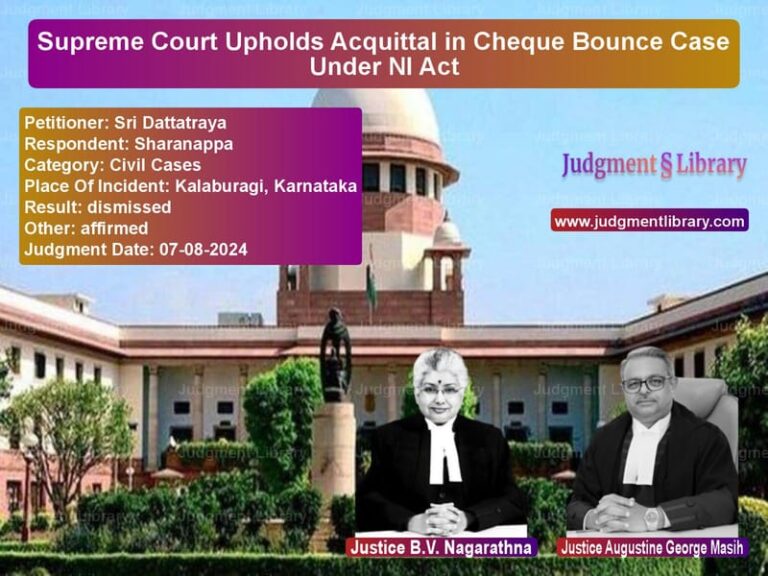Arbitration Award Execution: Supreme Court Allows Direct Filing Without Transfer
The Supreme Court of India, in the case of Sundaram Finance Limited v. Abdul Samad & Anr., resolved a long-standing legal controversy regarding the execution of arbitral awards under the Arbitration and Conciliation Act, 1996. The Court ruled that an arbitral award can be executed directly in any jurisdiction where the debtor’s assets are located, without the need to first file it in the court where the arbitration took place.
Background of the Case
The appellant, Sundaram Finance Limited, had granted a loan to respondent Abdul Samad for purchasing a Tata Lorry-HCV in 2005. The respondent defaulted on loan repayments, leading to arbitration proceedings as per the loan agreement. The arbitrator passed an ex parte award on October 22, 2011, directing the respondent to pay Rs. 12,69,420 with 18% annual interest.
To enforce the award, Sundaram Finance filed execution proceedings in the Morena District Court, Madhya Pradesh, under Order 21 of the Code of Civil Procedure, 1908 (CPC). However, the trial court rejected the petition, ruling that the execution must first be filed in the court with jurisdiction over the arbitration proceedings before obtaining a transfer to Morena.
Conflicting judgments from different High Courts on whether arbitral awards must first be filed in a court of primary jurisdiction led the appellant to approach the Supreme Court.
Key Legal Issues
- Whether an arbitral award needs to be first filed in the court having jurisdiction over the arbitration proceedings before being executed elsewhere.
- Whether an award under Section 36 of the Arbitration and Conciliation Act is to be treated as a decree for direct execution.
- Interpretation of Section 42 of the Arbitration Act in the context of execution.
Arguments Presented
Petitioner (Sundaram Finance Limited)
The petitioner contended:
- The award is directly executable as a decree under Section 36 of the Arbitration and Conciliation Act.
- There is no requirement under law to first file for execution in the jurisdiction where arbitration was conducted.
- Order 21 Rule 27 of the CPC allows direct execution of a decree in the jurisdiction where assets of the judgment debtor are located.
- The conflicting High Court rulings on this issue create unnecessary procedural delays, warranting a definitive ruling.
Respondents (Abdul Samad & Anr.)
The respondents argued:
- The trial court’s ruling aligned with the legal position adopted by the Madhya Pradesh High Court.
- Under Section 42 of the Arbitration and Conciliation Act, all proceedings must be filed in the same court where arbitration was conducted.
- The petitioner should have first obtained a transfer of the award before filing for execution.
Supreme Court’s Analysis
1. Nature of an Arbitral Award
The Supreme Court clarified that an arbitral award, once it becomes enforceable under Section 36, is treated as a decree of the court. The Court observed:
“The award is to be enforced in accordance with the provisions of the Code of Civil Procedure, 1908, in the same manner as if it were a decree of the court.”
2. Execution Without Transfer Requirement
The Court ruled that there is no requirement to first file an execution petition in the jurisdiction of the arbitration before seeking execution elsewhere. It stated:
“There is no necessity of first approaching the court where the arbitration took place. The award holder can proceed directly in the jurisdiction where the assets of the judgment debtor are located.”
3. Section 42 of the Arbitration Act
The respondents relied on Section 42, which states that all arbitration-related applications must be filed in one court. However, the Court clarified:
“Section 42 applies only to arbitral proceedings. Once an award is made and becomes enforceable, execution is independent and is governed by the Civil Procedure Code.”
Supreme Court’s Verdict
The Supreme Court allowed the appeal, setting aside the trial court’s ruling. The judgment established that:
- An arbitral award is directly executable as a decree, without requiring prior filing in any specific jurisdiction.
- Execution proceedings can be initiated directly in the jurisdiction where the debtor’s assets are located.
- Section 42 of the Arbitration Act does not apply to execution proceedings.
- The ruling aligns with the position adopted by the Delhi, Kerala, and Madras High Courts, rejecting the contrary views held by the Madhya Pradesh and Himachal Pradesh High Courts.
Implications of the Judgment
This ruling has significant implications for arbitration law and execution proceedings:
- Expedited Enforcement: Award holders can now directly file execution petitions without procedural delays.
- Uniform Legal Clarity: The judgment resolves conflicting High Court rulings, ensuring a consistent approach nationwide.
- Ease of Recovery: Businesses and financial institutions benefit as they can recover dues without being restricted by jurisdictional technicalities.
- Reduced Legal Costs: Avoiding unnecessary court filings saves time and resources for litigants.
Conclusion
The Supreme Court’s decision in Sundaram Finance Limited v. Abdul Samad & Anr. is a landmark ruling in arbitration law. By allowing direct execution of arbitral awards, the Court has simplified the enforcement mechanism, ensuring faster recovery for award holders. This judgment reinforces the pro-arbitration stance of Indian law, making arbitration a more effective dispute resolution mechanism.
Petitioner Name: Sundaram Finance LimitedRespondent Name: Abdul Samad & Anr.Judgment By: Justice J. Chelameswar, Justice Sanjay Kishan KaulJudgment Date: 15-02-2018
Don’t miss out on the full details! Download the complete judgment in PDF format below and gain valuable insights instantly!
Download Judgment: Sundaram Finance Lim vs Abdul Samad & Anr. Supreme Court of India Judgment Dated 15-02-2018.pdf
Direct Downlaod Judgment: Direct downlaod this Judgment
See all petitions in Arbitration Awards
See all petitions in Enforcement of Awards
See all petitions in Dispute Resolution Mechanisms
See all petitions in Judgment by J. Chelameswar
See all petitions in Judgment by Sanjay Kishan Kaul
See all petitions in allowed
See all petitions in supreme court of India judgments February 2018
See all petitions in 2018 judgments
See all posts in Arbitration and Alternate Dispute Resolution Category
See all allowed petitions in Arbitration and Alternate Dispute Resolution Category
See all Dismissed petitions in Arbitration and Alternate Dispute Resolution Category
See all partially allowed petitions in Arbitration and Alternate Dispute Resolution Category







